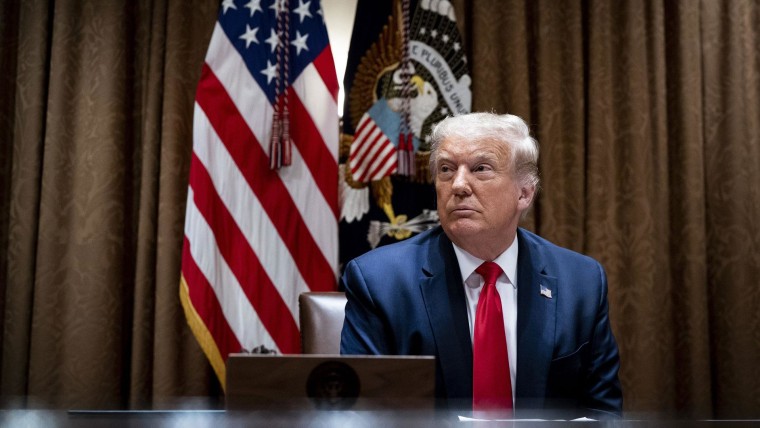WASHINGTON — Beijing does not want to see a Cold War break out between China and the U.S. and both countries need to work to repair relations that are under "unprecedented" strain, Beijing's envoy to Washington said on Tuesday.
"I don't think a new Cold War would serve anybody's interest," said Cui Tiankai, a veteran diplomat who serves as China's ambassador to the U.S., at the Aspen Security Conference.
"I don't know why people like the term Cold War so much," Cui told Andrea Mitchell of NBC News, who interviewed the ambassador and also took questions from the virtual audience. He accused the Trump administration of stoking tensions, and said, "We're in the 21st century. Why should we allow history to repeat?"
Cui's comments came against the backdrop of mounting friction between Beijing and Washington and an emerging bipartisan consensus in Congress that the U.S. needs to take a tough line with China.
The ambassador dismissed U.S. criticism of China's trade practices and accusations that Chinese technology companies such as TikTok pose a threat to consumer privacy in America and elsewhere.
"I don't think there's any evidence that any company is giving such information to the Chinese government. People make these accusations but never show us any evidence," he said when asked about TikTok.
Cui said the Trump administration's threats to ban TikTok in the U.S. contradicted Washington's publicly stated commitment to open markets.
"To accuse China of not giving American companies a level playing field, while at the same, they themselves are denying a Chinese company such a level playing field — this is extremely unfair," he said.
President Donald Trump initially threatened to expel TikTok from the U.S. market but has since said he would be open to the software giant Microsoft buying the company.
The lowest point in nearly 50 years
Cui said relations between the U.S. and China were at the lowest point in nearly 50 years, since President Richard Nixon opened a dialogue with Beijing in 1971.
"We are at a very critical moment in our relations," the ambassador said.
The deterioration in relations is "unprecedented since Dr Kissinger's visit almost a half century ago," he said, referring to then-National Security Adviser Henry Kissinger's groundbreaking trip to China in 1971.
"The normalization of relations between our two countries and the growth of this relationship over decades ... has served the interests of both countries and the world very well," the ambassador said.
Despite current tensions, Cui said there was room for cooperation on a range of issues, including on trade, the coronavirus pandemic, climate change and nuclear proliferation.
"Both sides, both of us have to work harder to overcome the current difficulties, to try to dispel suspicion, doubts or even fear," he said. "We have to build a constructive and mutually beneficial relationship for the future."
Although Trump previously touted his rapport with China's president, Xi Jinping, and often refrained from criticizing Beijing over its human rights record, the administration has taken an increasingly confrontational tone with China.
In recent weeks, besides threatening to bar TikTok, the Trump administration has ordered the closure of China's consulate in Houston over espionage allegations, imposed sanctions on senior Chinese officials and Chinese companies over the treatment of Uighurs in Xinjiang and labeled China's territorial claims in the South China Sea illegal.
Cui said the Trump administration's actions and language have caused public outrage in his country. "The Chinese people, they are also very much shocked, they feel very disappointed by what's happened," he said. "There's a rising anger among the Chinese public."
Trump touted the "Phase One" trade agreement agreed this year with China as a success and had accused his predecessors of allowing Beijing to have an unfair advantage over American companies. But some China hawks in Washington have questioned the trade agreement and suggested the administration consider blowing up the deal.
Cui, however, expressed optimism on the trade front, saying the "Phase One" deal was being implemented and the two sides were discussing a second trade agreement.
"As far as I know, the two economic teams have been in touch with each other. We are making good progress," he said.
China carried out all of its commitments in the Phase One deal within the first four months, he said, including purchasing American agricultural products, though the coronavirus pandemic has hindered trade.
Cui defended China's handling of the pandemic, saying his government shared information with the rest of the world promptly. And he rejected criticism of China's behavior in the strategic South China Sea, where Beijing has clashed with neighboring countries over territorial disputes.
The ambassador accused the U.S. of fueling tensions in the South China Sea by deploying ships and aircraft to the region.
"This is really raising the risk of a conflict or confrontation," he said.
Washington says U.S. Navy patrols are conducted in international waters and airspace to uphold "freedom of navigation" rights for all countries.
World - Latest - Google News
August 05, 2020 at 09:09AM
https://ift.tt/30r7UJk
U.S.-China relations are under 'unprecedented' strain, says Chinese ambassador to the U.S. - NBC News
World - Latest - Google News
https://ift.tt/2SeTG7d
https://ift.tt/35oCZy1
Bagikan Berita Ini
















0 Response to "U.S.-China relations are under 'unprecedented' strain, says Chinese ambassador to the U.S. - NBC News"
Post a Comment